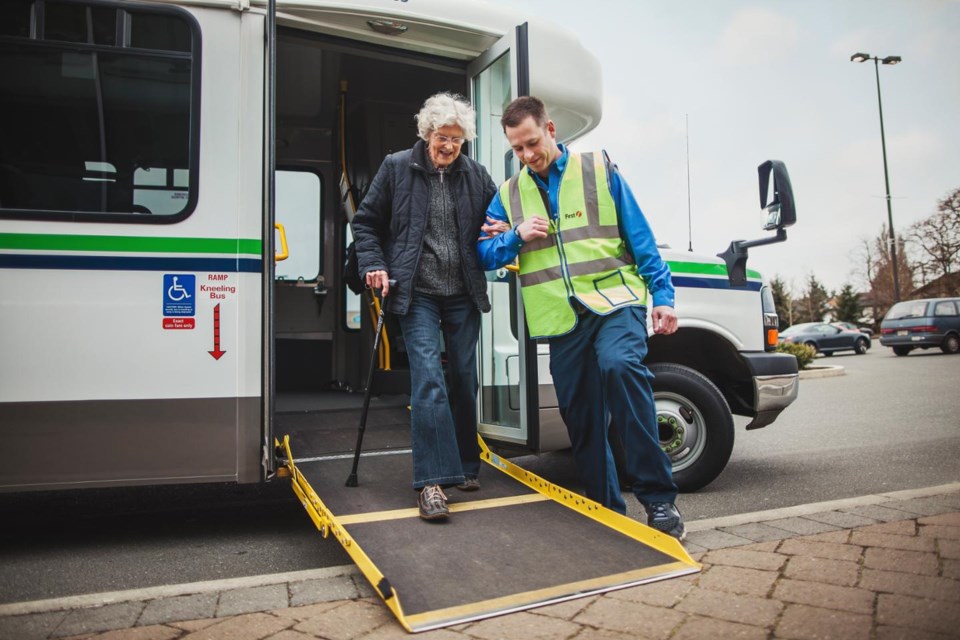TransLink’s board of directors heard concerns Wednesday, from one member of the public, that the special BC Bus Pass program for disabled riders discriminates by not affording the right to anonymity when using the transit system.
The man, identified only as Robin, spoke to TransLink’s board this week as the Mayors’ Council on Regional Transportation received a report on HandyDART services for the disabled showing how the COVID-19 pandemic had impacted services.
Robin stated how the BC Bus Pass card issued to disabled (and low-income) people has their name on it. This is done, he said, out of an unapparent concern from officials that riders would otherwise abuse their cards (presumably by sharing, selling or renting).
But Robin said he obtained a report from the provincial government, via a freedom of information request, that he says showed no justification for such a policy.
“There doesn’t seem to be a balancing in anything I’ve read where we’re sort of looking, ‘So here’s a problem and is this more important than a disabled person’s right to privacy, for example, or their right not to be treated in a discriminatory manner by being singled out by having a pass that’s different than non-disabled people?’” said Robin.
Speaking on behalf of a disabled family member, Robin said officials should consider a sociological lens in its policy and not jump the gun in assuming disabled people are scofflaws; rather, officials should consider why that perception may exist — and he points to the fact disabled people receive just $1,483 from the provincial government as a monthly living allowance.
“A reasonable person could say, ‘Oh well, that’s probably why there’s this misuse; and to further penalize persons with disabilities, to make them have this pass that sort of leaks personal information, we don’t see that as appropriate and it does make our family member, who is disabled, feel singled out,” said Robin.
Regardless of TransLink’s reasons, the policy discriminates, said Robin, while suggesting disabled people should be granted passes the same as non-disabled people.
The BC Bus Pass is administered by the BC Ministry of Social Development and Poverty Reduction and issued through two transportation authorities: TransLink and BC Transit. It comes in the form of a red Compass card for TransLink users.
“There’s no reason …that TransLink could not provide a normal blue Compass card, or the novelty passes, loaded with a monthly pass to persons with disabilities,” said Robin.
“They should have a Compass card that looks like anyone else’s and I think that’s really reasonable,” said Robin; otherwise, “it feels like a reverse onus case.”
Board chair Lorraine Cunningham said TransLink would be responding to the concerns but did not specify when.
TransLink spokesperson Dan Mountain said TransLink has offered Robin a sleeve to protect his family member’s card from public view.
"The BC Bus Pass Compass Card includes the recipient’s name to ensure the pass is used by the person it is issued to, which is the standard practice for any specialty pass issued by TransLink," noted Mountain.
HandyDART expects growth after pandemic setbacks
Meanwhile, the Mayors’ Council on Regional Transportation received a report on HandyDART at its board meeting Thursday.
While disabled people often use the regular transit network, HandyDART shuttles exist for those with special needs.
“As our regional population continues to grow, with around 50,000 newcomers moving to Metro Vancouver every year, along with our aging population, HandyDART demand is expected to increase,” noted TransLink CEO Kevin Quinn in the report.
In total, 964,800 HandyDART trips were delivered in 2022, which is just 70 per cent of 2019 levels (1,315,400 trips), the report stated. There were 964,800 trips delivered across the Metro Vancouver region.
The report stated customers experienced slightly longer wait times on the phone in 2022, compared to the prior year. Although, when a shuttle did arrive, it arrived on time 92 per cent of the time, slightly higher than in 2019.
Statistics show the percentage of longer trips increased since the pandemic, as TransLink suspects customers found alternative means of travel for shorter trips.
The report also shows TransLink has become more reliant on taxis to supplement rides when a HandyDART shuttle is unavailable. This aligns with steady growth in taxi usage since 2015. In 2022, there were 167,700 “supplemental taxi trips,” or 17.4 per cent of all trips. In 2019, taxis accounted for 13.3 per cent of trips. This is despite TransLink budgeting for 1.38 million trips in 2022. HandyDART had 339 vehicles operating in 2022.
This article was edited Sep. 29 to reflect that the BC Bus Pass program is not entirely free; rather, there is a $45 annual fee.



